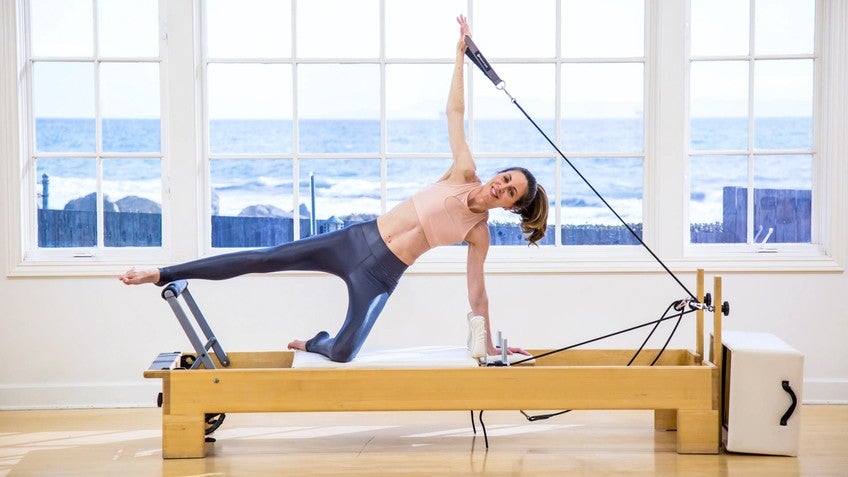A Journey with Multiple Sclerosis and Pilates
Ten years ago, my life was falling apart – literally. I had quit my job, canceled my lease, and was packed to relocate to a new city when my then-boyfriend stood me up for the move. I found myself living with my parents and trying to come to terms with the disaster that was my life. To say it was a stressful time would be an understatement.
I maintained my sanity through daily trail runs while I tried to pick up the pieces. “At least I can still run” was my mantra. Then one day, I couldn’t. I could barely walk. Fast-forward through multiple doctors, medical tests, weeks of waiting, and far too much time self-diagnosing on WebMD, and the final verdict was Multiple Sclerosis (MS).
Looking back, I had actually had symptoms for years – random numbness here and there, vertigo that came and went. I always blamed it on fatigue or a “pinched nerve.” The stressful series of events was the final straw to health problems I had ignored for years. And MS was my wake-up call. Enter Pilates.
Although the research on MS and Pilates is very limited and mostly anecdotal, Pilates was recommended by my neurologist for one reason only – it’s low-impact. I couldn’t run anymore (at that point, walking wasn’t really working either), so he said I could try yoga or Pilates. When asked, he said they are pretty much the same!
For those of you who aren’t familiar with MS - in the disease’s active state, the myelin, a protective sheath around a nerve cell, is damaged. This creates interference in the signals traveling from the brain, spinal cord, and nerves. Since myelin damage can impact the entire body, the disease can produce a huge range of symptoms – so many different ones that if you ever watch House, you’ll note that MS is almost always thrown out as a potential diagnosis.
Symptoms can include pain, muscle weakness, partial paralysis, vertigo and balance problems, sleep disturbances, temperature intolerance, bladder problems, muscle tightness, memory problems, and even a really bad attitude. In most cases, excessive heat, improper exercise, and stress (like living with your parents) can all exacerbate symptoms or cause relapses.
Pilates as part of my health plan turned out to be so effective that I started teaching it just a couple of years later. In my opinion, there is no better exercise for a client with MS.
But, first and foremost, it can be tailored to address or work-around almost any problem.
In Pilates, you learn how to move correctly, with the right muscles, firing at the right time. This helps prevent fatigue (an extremely common symptom) because you aren’t using more muscles than necessary. And, if the nerves aren’t sending a muscle the message, you can still work the surrounding muscles. You’d be amazed at what you can accomplish by strengthening muscles other than the ones that aren’t working correctly.
Pain is another common symptom that Pilates manages well. Pain can include muscle aches caused by improper movement or neuropathic pain, resulting from damage to the nerve fibers themselves.
In my personal experience (shared by several clients), neuropathic pain increases during heated aerobic activity. But, Pilates minimizes this pain, simply by allowing me to be present and feel my body through complex actions that require intense concentration. It is that concentration that distracts from the pain itself.
Many MS patients, myself included, will have one-sided muscle weakness. In doing a simple pelvic curl, for instance, I engage my right hamstring more than my left. In teasers, I inadvertently (and sometimes intentionally) use my stronger right leg to “prop up” my left. Over the years, uneven strength and muscle compensations have resulted in a slight misalignment of my pelvis.
Luckily, Pilates can work on that.
What’s unique in neurological, one-sided weakness is that, although it’s common in rehab to take the “weak side first, then strong side, then weak side again” approach, I’ve found it works better to start with the “good side” first. By going through the movement there and telling the brain what you want the body to do, it is easier to then repeat on the side with weakness or proprioception problems. Suddenly, the weak side “gets it.”
All exercises and activity should be a ‘challenge,’ but never a ‘struggle.’
Teachers, don’t underestimate your clients, though. Exercise used to be discouraged for MS patients – period. Now, studies are showing that exercise is neuro-protective and anti-inflammatory, and many feel better when their workouts are intense. In fact, although friends initially thought I would lean towards teaching therapeutic Pilates, I love to work hard and prefer to teach intense advanced-level classes. When I was looking for a mentor, I chose Julian Littleford (if you’ve taken any of his classes here, you’ll know “easy” isn’t his thing.) Still, I’ve learned to listen to when my body says to slow down – the most important lesson anyone can learn about their health.
Comments
You need to be a subscriber to post a comment.
Please Log In or Create an Account to start your free trial.

























